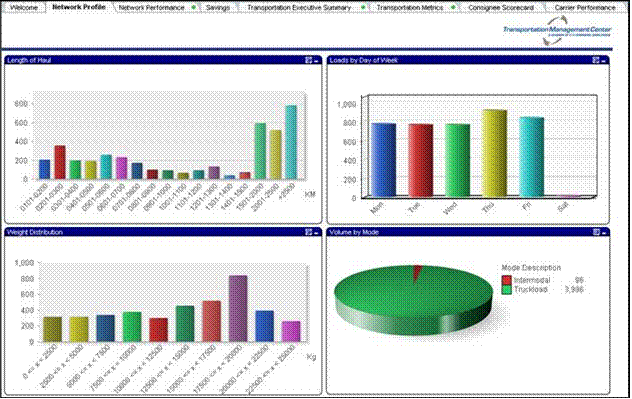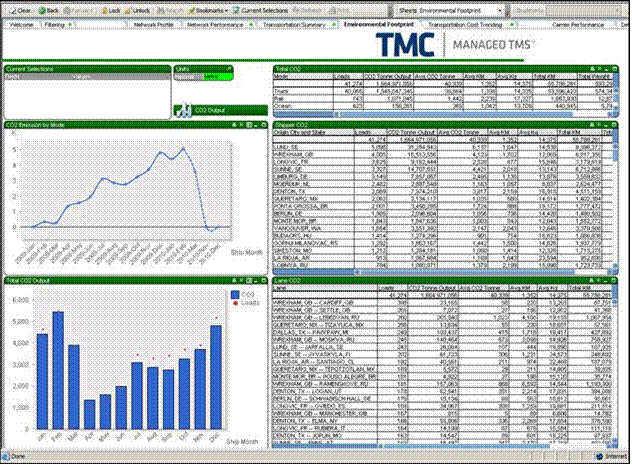C.H. Robinson Worldwide Leverages its TMC Model in Extending its Global
Reach
Chicago, Illinois USA and Amsterdam, Netherlands Site Visits
May 6, 2010
By
Evan Armstrong
Key Personnel:
Chris O’Brien, Vice President–C.H. Robinson Worldwide
Jordan Kass, Executive Director–TMC
Chris Brady, General Manager, Americas–TMC
Glenn Koepke, General Manager, Europe–TMC
Jason Chamberlain, General Manager, Americas–TMC
Duff Davidson, Director, Business Development–TMC
Jim De Vries, Director, Operational Excellence–TMC
C.H. Robinson Worldwide Overview
Founded in 1905, C.H. Robinson Worldwide has grown to be a top ten global third-party logistics provider (3PL) with 2009 gross revenue of $7.6 billion and net revenue of $1.4 billion. Its staff of 7,300 manages a network of 235 company owned offices in 22 countries. Its non-asset based transportation management centric operations managed over 7.5 million shipments in 2009 including over 250,000 ocean containers through its growing freight forwarding operations. C.H. Robinson Worldwide (CHRW) has established contracts with over 47,000 transportation providers and has long-term contracts with over 14,500 customers.
With such a large network and service portfolio, C.H. Robinson Worldwide has multiple transportation management service lines. One option for customers with complex transportation networks is to use CHRW’s TMC operating division. The TMC managed TMS (transportation management system) approach has been one of the cornerstones to CHRW’s expanding domestic and global operations. It takes a flexible/collaborative approach with customers who often maintain a significant number of contracts directly with transportation providers and rely on TMC operations and IT to optimize daily transportation management functions and for ongoing process improvement.
CHRW’s TMC operations have played a significant role in its expanding global operations and have significant market momentum, growing at over 20% per year. Since its services tend to be fairly unique to CHRW, we will focus on the TMC in the sections below.
TMC Overview, Strategy and Service Offering
As an independent internal division of C.H. Robinson Worldwide, the TMC processed over two million shipments in 2009 and had over $1 billion in freight under management (FUM). It manages customer transportation networks in North America, Europe, and South America and is looking to launch operations in Asia mid 2011 and expand over the next five years. The TMC’s staff of 150 employees is primarily domiciled at its Chicago, Illinois headquarters. Six are based at its Amsterdam, Netherlands TMC operation which opened in 2008. Managing large transportation networks requires solid supply chain management systems and the TMC, together with CHRW has an annual information technology spend in excess of $80 million. The TMC has over 30 customers and its accounts include: Boise, Ocean Spray, Dole Foods, John Deere, Tetra Pak, Johnson Controls, Haier America and Subway.
TMC’s strategy is to focus on working with large shippers with transportation spends in excess of $5 million. Its average customer has a transportation spend of $50 to $60 million. Many of its customers exceed $100 million in annual transportation spend. The TMC works with customers in developing optimal transportation networks through its consulting, modeling, and lean six-sigma approach. It then deploys its personnel and IT for daily transportation planning, management, and continuous performance improvement. If the customer chooses, the TMC can utilize CHRW’s freight brokerage and international freight forwarding capabilities, but does so in a customer directed fashion versus a single-source model. Most TMC customers are using a mix of their own contract carriers and often retain control of their carrier relationships and rate negotiations. Once operations are up and running, the TMC provides very detailed measures of service and performance though its business intelligence tools and works with customers to make ongoing process improvements. It is a true network transportation management approach and the TMC only charges customers a management fee as a percent of FUM for its services and the use of its IT. Typical customer transportation savings tend to be in the 15% to 20% range.
TMC Online Business Intelligence Tools
An impressive part of the TMC’s managed TMS approach is its proprietary (TMC developed) online business intelligence (BI) tools. Supported by an enterprise data warehouse, the online business intelligence tools provide shippers with leading edge information for making supply chain process improvements and cost reductions.
As the “screen shot” below shows, on one screen a customer can see all of its transportation network information including: the number of shipments by length of haul, loads tendered to carriers by the day of the week, shipment weight distributions, and load volumes by carrier mode.
Figure 1 – Network Profile View

Additional dashboards are available and can be customized to each customer’s requirements. They typically report metrics based upon the mode of transport, lane performance, shipment volumes, payload maximization effectiveness, cycle times, and exception management criteria. Typical service comparisons include actual on time pickup and delivery and individual carrier performance metrics against defined service level benchmarks. Overall, the TMC’s online applications provide a good deal of functionality and well presented “actionable” information.
In addition to operational and service reporting, the TMC has recently added functionality to allow customers to track their transportation environmental (carbon dioxide) footprint as shown in the figure below.
Figure 2 – Environmental Footprint Monitoring Online Report

It has also added social network functionality—“TMC connect”—providing an easy online way for customers to brainstorm process improvement ideas with other customers and TMC personnel. TMC connect also provides a platform for the TMC to communicate new products and features.
European TMC Operations
At the request of some of its major customers, C.H. Robinson Worldwide researched the market potential of opening a TMC operation in Europe. Once the opportunities were quantified and a business plan was developed, C.H. Robinson Europe began bringing its European TMC operation online in October 2008. Significant operating and information technology areas of adaptation for Europe included operating in multiple cultures/languages, incorporating value-added tax (VAT) functionality into the C.H. Robinson transportation management system, managing networks with different hours of operations, uneven electronic connectivity between transportation parties versus North America, and the use of routing guides with more than just one provider in a lane. Once the TMC model was adapted for the European market, it began operations for its first customer in February 2009. TMC Europe is collocated within its existing Amsterdam office with the C.H. Robinson Europe freight forwarding branch operation.
The European TMC operation currently has a staff of six managing over 50,000 annual truckload and less than truckload (LTL) shipments. As in the U.S., the Amsterdam TMC electronically receives customer orders, develops transportation plans and tenders shipments to carriers across multiple modes. In addition, C.H. Robison is providing freight bill audit and payment services for shipments handled in the EU. The process is seamless and highly automated. Most shipments move from electronic order entry to carrier tendering without human intervention. The TMC staff concentrates on working out operating exceptions, coordinating carrier dock assignments, and providing customer support.
To support European operations, C.H. Robinson’s TMC has customized its proprietary “CHRWOnline” transportation management system (TMS) and dubbed it “CHREU Online”. The TMS has been used for eight years in Europe and is supported by a European based IT development team. It can manage customer orders, assign orders to shipments and tender shipments to carriers. The system provides C.H. Robinson personnel, customers, and transportation providers with personalized interfaces for managing orders, shipments, payment processing, exception handling, and providing online supply chain visibility. In addition, CHREU Online has been customized to handle VAT accounting issues, different country postal codes, and multiple languages.
Overall, the TMC European and North American operations provide a cohesive web-based system functioning as a global control tower.
Ocean Spray TMC Customer Case Study
What the TMC has done for Ocean Spray is a very good example of how it approaches complex transportation management networks and works with customers in improving their supply chains.
Ocean Spray is an agricultural cooperative owned by more than 700 cranberry growers and more than 50 Florida grapefruit growers. Ocean Spray is North America’s leading producer of canned and bottled juices and juice drinks and it generated revenue of $2 billion in 2009.
Ocean Spray‘s supply chain is very complex utilizing multiple transportation modes from bulk truckload to LTL. From inbound shipments of raw materials to retail deliveries, there are multiple variables and decisions that directly affect the quality, price, and marketing success of Ocean Spray products. About five years ago, the supply chain leadership at Ocean Spray decided to take a proactive approach to this complex supply chain and seek out the best available talent and technology to optimize its transportation network. After a significant evaluation process, it selected the TMC for its network transportation management.
Ocean Spray’s decision to move to a TMC managed solution was prompted by carefully monitored metrics. The company’s previous strategy consisted of a 3PL managing Ocean Spray’s carrier relationships. The 3PL worked remotely from its headquarters and had little interaction with Ocean Spray’s operations, customer service, or supply chain teams. “It was also a situation where the provider’s team that managed our business was also managing several other clients,” said Wayne Tessin, director of logistics for Ocean Spray.
In addition to freight costs, Ocean Spray carefully tracked on time delivery since it had a strong impact on sales. Under the previous model, Ocean Spray was averaging 85% on time delivery. “While that may have been at or above industry standards, we knew that if we drove that number higher, we’d have a measurable impact on sales,” Tessin said.
Tessin and his team first reviewed software-based solutions the company could implement on its own. “There were too many drawbacks for us,” Tessin said. “The initial purchase price was considerable. When we added up the ongoing maintenance fees, we simply couldn’t make the ROI model work.” “We also tried a web-based solution and applied it to our inbound freight, but it didn’t work well for us,” Tessin continued. “It ultimately wasn’t integrated with our outbound operations. We discovered how important that integration can be.”
The Ocean Spray team finally settled on a managed TMS solution from the TMC. “We decided that the TMC’s approach of providing us with dedicated, onsite TMS power users and allowing us to manage carrier relationships held a lot of promise,” Tessin said.
Once the operation was up and running with CHRW’s TMC, on time deliveries quickly climbed from 85% to 95%. “It’s simple. If our customers have our products on time, they sell more of them and order more of them,” Tessin said. “Improving on time performance by 10% was a remarkable feat, because we were efficient before. Now, we’re incredibly strong.”
Another key operating metric for Ocean Spray is carrier acceptance. With carriers accepting more than 75 percent of the loads tendered to them, transportation costs have been positively affected almost as much as on time delivery. “TMC does a great job of managing the route guide,” Tessin said. “When we keep tenders with the first two or three carriers, we’re able to keep costs where we want them.”
In addition to online management of Ocean Spray’s route guide, the TMC’s business intelligence tools help Ocean Spray identify and take advantage of potential cost savings opportunities throughout its network. “The reports we get from the TMC allow us to track a variety of important costs such as cost per load delivered, transfer costs, utilization, miles traveled, and cost per mile. We can get right down to the cost of a particular case of product,” Tessin said. “When we have accurate, real-time data, we can make decisions throughout the supply chain that can drive down costs.” “The cost information we extract from the TMC’s customized reports also is central to our budgeting and pricing activities. Our analysts look at detailed metrics at the lane level. They evaluate volume, mix, quantities, ordering patterns, and other key factors,” Tessin added. “So the impact of the information we get extends far beyond the transportation network.”
Tessin said relationships with the company’s carriers are stronger than ever with the TMC. “We have previously allowed providers to choose carriers, negotiate contracts and monitor scorecards. I feel like we lost ground in both service levels and capacity when we did that. Having the TMC manage the route guides while we manage the carrier relationships has resulted in better performance, better relationships and better outcomes.”
The TMC also manages appointment setting for Ocean Spray. “We used to have the carriers set their own delivery appointments,” Tessin said. “But that resulted in a lot of inconsistency. Each carrier did it their own way, and it could get confusing for our customers.” The TMC also collects data from the appointment setting process and includes it as part of management reporting. “We collect a lot of good information from the appointment setting process, such as what kinds of things are our customers are asking for,” Tessin said.
Tessin believes one of the keys to Ocean Spray’s years of process improvements has been the dedicated, onsite TMC team which works alongside his team. “The TMC power users are an extension of the Ocean Spray transportation team,” he said. “They are intimately aware of what’s going on in our business. When something needs attention, I get an email quickly and I am able to take action,” Tessin said. “They are involved in our staff meetings, they routinely bring us new ideas, and they fit extremely well with our culture.”
Through its collaborative approach and process improvements, the TMC has earned Ocean Spray’s “Third-Party Logistics Provider of the Year” award and is continuously working on ways to improve Ocean Spray’s supply chain.
Summary
The TMC is starting to be recognized by customers as a unique solution within the large C.H. Robinson Worldwide service offering and provides a distinctive approach in supporting complex network transportation management operations such as Ocean Spray’s. In addition, CHRW has replicated its North American TMC business model strengths in the European and South American markets. We see its managed TMS approach continuing to meet the needs of large shippers requiring extensive transportation management with solid IT support. With new international capabilities, the TMC is gaining appeal amongst multi-nationals managing global supply chains and it is driving the TMC’s above average growth.
Sources: A&A Primary Research, http://www.chrobinson.com/


